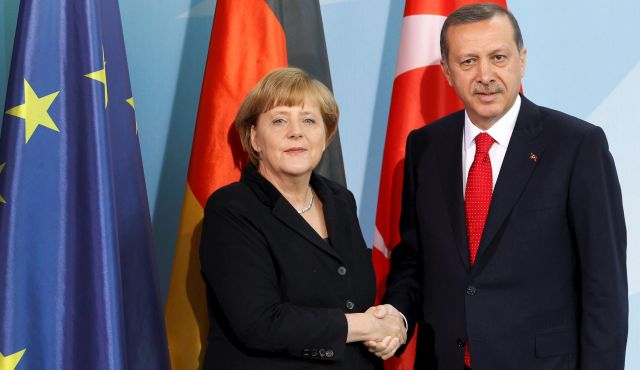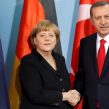
Turkey-EU Relations: A New Beginning?
Publication: Eurasia Daily Monitor Volume: 10 Issue: 37
By:

In the last two and a half years, Turkey’s progress toward European Union membership has been frozen. After successfully closing one of the 35 “chapters” in the EU accession process, no other chapter has been opened; France and Greek Cyprus have been actively blocking some chapters from being reviewed at all. As a reaction to the faltering membership process, Prime Minister Recep Tayyip Erdogan recently suggested that Turkey could abandon its European quest in favor of joining the Shanghai Cooperation Organization (SCO) (see EDM, January 31).
However, as the rotating presidency of the EU Council of Ministers has transferred from Greek Cyprus to Ireland on January 1, 2013, Turkey increased its pressure on the EU to resume the membership negotiations. In early February, Prime Minister Erdogan traveled to Central Europe with official visits to Slovakia, the Czech Republic and Hungary to seek support for a revival of Turkey’s European integration process. During his visit, Erdogan harshly criticized the EU, stressing that European countries rely on unfounded excuses to block Turkey’s EU membership (TRT, February 7). Erdogan further said, “Turkey has a lot to offer Europe. Some European leaders fail to see or they do not want to see it” (Anadolu Ajansi, February 5).
Good news emerged from Paris this month, however. France had unilaterally blocked five accession chapters for Turkey during former President Nicholas Sarkozy’s rule. But following the election of Francois Hollande last year, Paris softened its position on Ankara’s accession process and unblocked one of the five chapters that the Sarkozy government had vetoed opening. On February 12, after meeting with Turkish Foreign Minister Ahmet Davutoglu, his French counterpart, Laurent Fabius, said France would assist Turkey with opening Chapter 22, entitled “Regional Policy and Coordination of Structural Instruments” (Hurriyet Daily News, February 12).
Parallel with the announcement, Erdogan scaled back his harsh rhetoric toward the European Union during a dinner with EU envoys. Following the reception, European diplomats found Erdogan to be “constructive” toward the EU (Hurriyet Daily News, February 12). As political observers rightly noted, Erdogan especially toned down his anti-French rhetoric in recent days, and welcomed Paris’s decision to unblock a chapter in Turkey’s EU talks (al-monitor.com, February 15).
Helene Flautre, the co-chairwoman of the EU-Turkey Joint Parliamentary Committee (JPC), stated that “2013 is preparing to be a very positive year for Turkey’s EU bid,” and claimed that “lifting the block on Chapter 22 is just the first stage showing France’s positivity toward Turkish membership”—alluding that French authorities may eventually lift their block of other chapters (Today’s Zaman, February 17). Soon thereafter, Turkey’s European Union Minister and Chief Negotiator Egemen Bagis went to Paris with a group of Turkish journalists to attempt to hasten this process (TRT, February 20).
Ankara’s relations with Turkey-skeptic Berlin have also recently been on an upswing. German Chancellor Angela Merkel paid an official visit to Ankara on February 25, to discuss Turkey-EU relations and bilateral cooperation in preventing Kurdish Workers’ Party (PKK)-linked terrorism (CNNTurk, February 25). “Turkey’s negotiation with the EU is an open-ended process,” Merkel noted. And although the German leader is politically opposed to Ankara’s European accession, she added, “Although I have qualms about Turkey’s membership in the EU, I want to continue the negotiation process.” The chancellor suggested Turkey implement the Ankara Protocol, which asks the country to open its ports to Greek Cyprus ships. Additionally, Merkel agreed with Erdogan to closely cooperate against PKK activities in Germany, where the organization is very active among the Kurdish diaspora (abhaber.com, February 25).
Political observer and Galatasaray University (Istanbul) professor Beril Dedeopglu thinks that 2013 will be a year of opportunity for Turkey; many positive signs indicate Turkey’s European progress will likely accelerate in the year ahead. In Cyprus, Nicos Anastasiades, who supported the Annan Plan back in 2004, was elected the country’s new president on February 24. And the Holland government in Paris has been more positively positioned toward Turkey as well (Star, February 20).
Turkish officials likely see the new leadership within the EU to be a good opportunity for Ankara to revitalize its stalled membership process. Furthermore, Turkey’s economic success has changed Europe’s negative view of the country. One of the main arguments against Turkey’s EU membership bid was that the poor Turkish economy would sink the European bloc if it was accepted as a full member. However, the Turkish press reports that approximately 3,000 high-ranking business managers and CEOs from European countries, mostly from Greece, Italy and Spain are currently searching for jobs in Turkey (Star, February 14). Moreover, Angela Merkel believes German companies can benefit from Turkey’s vibrant economic success (abhaber.com, February 19).
Domestically, however, many Turks have lost all hope of ever achieving EU membership. Two thirds of Turkish citizens do not think that Turkey should further pursue the European accession process (see EDM, January 30). In observing this phenomenon, Professor Dedeoglu suggests that Turkey needs to improve its public diplomacy push to convince and revitalize the Turkish people’s hopes toward the EU process.
Because of the constantly shifting political climate in Turkey and the wider Middle East, it is difficult to predict how intently Ankara will pursue EU membership over the coming year. However, Turkey may very well try to speed up this process ahead of 2015, as the Armenian diaspora in Europe prepares a new diplomatic offensive against Turkey on the 100th anniversary of the tragic events of 1915.




